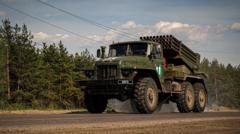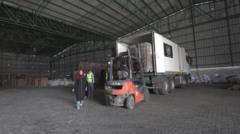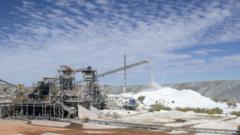Israel launched an air strike in Beirut's southern suburbs targeting a Hezbollah facility, asserting the threat posed by precision-guided missiles. The Lebanese presidency condemned the assault, urging the US and France to intervene. While Israel claims these actions are necessary for its defense, Western officials noted Hezbollah's compliance with the ceasefire agreement.
Tensions Escalate as Israel Strikes Beirut's Southern Suburbs

Tensions Escalate as Israel Strikes Beirut's Southern Suburbs
In a striking act that defies a five-month ceasefire, Israel conducts an air strike targeting Hezbollah in Beirut, prompting international calls for de-escalation.
Israel has intensified its military operations, launching an air strike on Beirut's southern suburbs on Sunday. This operation targeted a building allegedly used by the Iranian-backed group Hezbollah, despite a ceasefire established five months prior to halt hostilities. Israel justified the attack by claiming it was targeting a Hezbollah stockpile of "precision-guided missiles" which it deemed a threat to its national security.
In the wake of the strike, the Lebanese presidency swiftly condemned the action, demanding that the United States and France—both key players in the ceasefire negotiations—intervene to halt Israel's aggression. This air strike is significant as it marks the first attack on the area in nearly a month, focusing on Dahieh, a Hezbollah stronghold.
Despite the ceasefire agreement, Israel has been conducting regular strikes on perceived Hezbollah targets, citing ongoing threats. Western officials familiar with the situation noted that Hezbollah has largely adhered to the truce, while accusing Israel of multiple violations, including air strikes and drone surveillance.
Live reports showed vast plumes of smoke rising from the impacted area shortly after the Israeli evacuation order was issued for residents of Hadath. Fortunately, local civil defense teams reported no casualties as they quickly extinguished the resulting fire.
Following the air strike, President Joseph Aoun of Lebanon condemned the action in a statement released on social media platform X and called for immediate actions from guarantor countries to uphold the ceasefire. He stated, “Israel’s continued undermining of stability will exacerbate tensions and expose the region to real threats to its security and stability.”
The Israeli government, however, maintained that its military operations were essential to prevent Hezbollah from gaining strength, emphasizing that the Dahieh neighborhood would not be a safe haven for the group. Prime Minister Benjamin Netanyahu reinforced this stance, asserting that Israel would not tolerate any perceived threats.
Jeanine Hennis-Plasschaert, the UN Special Coordinator for Lebanon, expressed her concern over the strike, stating that it generated panic among civilians yearning for peace. She urged all parties to take constructive actions to support the ceasefire efforts.
This latest escalation follows a prior Israeli airstrike in the same area that resulted in four fatalities, including a Hezbollah official, further raising fears of a return to large-scale conflict over the region's volatile dynamics.




















